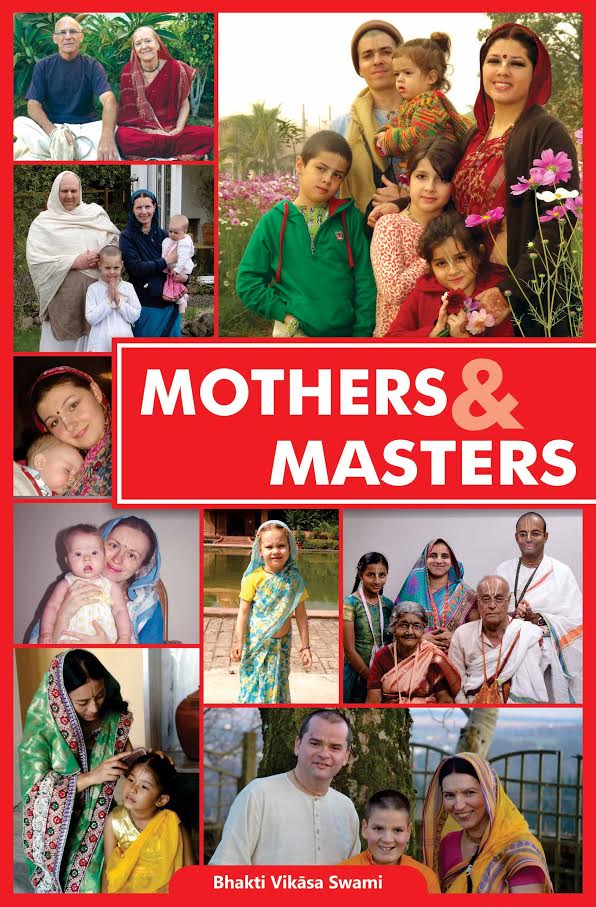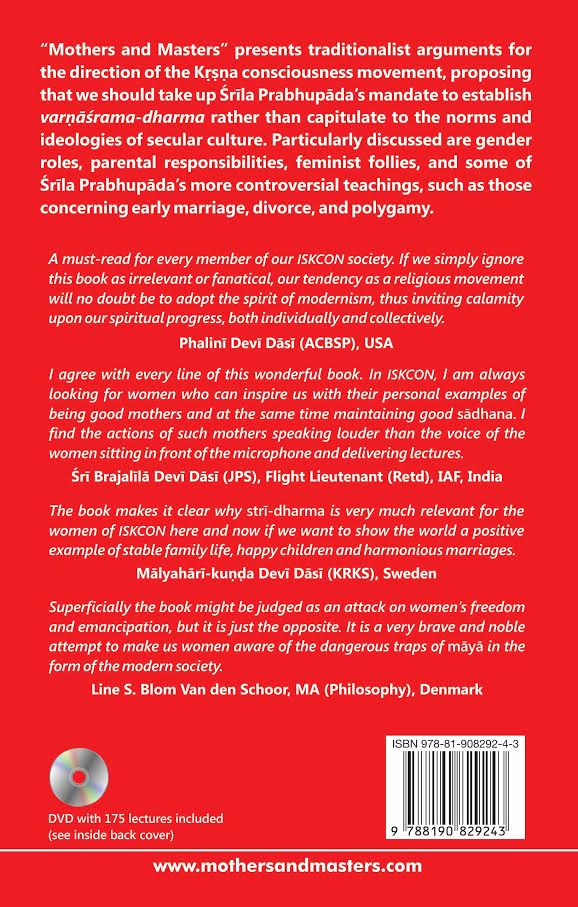Mothers & Masters
ORDER
Women: Masters or Mothers? presents traditionalist arguments for the direction of the Kṛṣṇa consciousness movement, proposing that we should take up Śrīla Prabhupāda’s mandate to establish varṇāśrama-dharma rather than capitulate to the norms and ideologies of secular culture. Particularly discussed are gender roles, parental responsibilities, feminist follies, and some of Śrīla Prabhupāda’s more controversial teachings, such as those concerning early marriage, divorce, and polygamy.
BOOK REVIEWS
Working on Bhakti Vikāsa Swami’s book Women: Masters or Mothers? has been inspirational in helping to deepen my understanding of Śrīla Prabhupāda’s example and instructions and has shown that we must carefully avoid the onslaught of the degraded mentality of Kali-yuga.
| Full Title | Mothers & Masters |
|---|---|
| Binding | Paperback |
| Pages | 320 |
| ISBN | 9789382109297 |
| Table of Contents | Preface to the Second Edition
Introduction
Part One
The Direction of the Kṛṣṇa Consciousness Movement: Merge with Modern Society, or Present the Varṇāśrama-dharma Alternative?
Devotees’ Concern with and Approach to Social Issues
Kṛṣṇa Consciousness Is Largely Incompatible with Modern Culture
Scientism, Liberal Humanism, and Self ishness
Hedonistic Civilizations Are Doomed
Traditional Societies and the Dharmic Culture of India
Śrīla Prabhupāda’s Outlook Was Not Mundane
Śrīla Prabhupāda Wanted to Introduce Divine Varṇāśrama-dharma
“Varṇāśrama-dharma Is External”
Devotees Need Varṇāśrama-dharma
Varṇāśrama-dharma (the Perfect Institution) Must Be Based On Kṛṣṇa Consciousness
Varṇāśrama-dharma Inculcates Selflessness
A Revolution of Consciousness
Varṇāśrama-dharma for Overcoming Sexual Desire
Śrīla Prabhupāda Slowly and Carefully Introduced Vedic Culture
Shared Cultures of Traditional Societies
“Preach Now, Varṇāśrama-dharma Now”
Śrīla Prabhupāda’s Vision for Kṛṣṇa Conscious Farms
Rural Living Af fords More Time for Kṛṣṇa Consciousness
Accepting Kṛṣṇa’s Social System
An Experimental Revolution
ISKCON’s Disconnect with Varṇāśrama
Traditional Culture Is Misunderstood
Slaughterhouse-education and Child Labor
Indian Culture and ISKCON
Preaching of Traditionalism in the West
An Overview of Religious and Political Reform
Ṛtvik Folly
The Basic Mistake of All Reformers
Understanding the Issues – Siddhānta
ISKCON Lite
ISKCON Has the Solution
Part Two
Women: Masters or Mothers?
Section One
Why Śrīla Prabhupāda Opposed Feminism
Demons Promote a Puf fed-up Concept of Womanly Life
Respect for Women in Indian Culture
Feminism in ISKCON
Nasty Ef fects of Feminism Within ISKCON
Misunderstanding Śrīla Prabhupāda’s Adjustments
Tweaking History by Blaming the Men
A Case Study: Yamunā Devī Dāsī
The Transformation of Women’s Roles
Lust, Greed, and Exploitation
Sigmund Freud and His Followers
Sex, Dissatisfaction, and Family Decline
Men and Women Are Dif ferent
Feminist Folly
Demonic “Broad-mindedness”
Why Women Need Protection
Independent Women Are Unprotected, Exploited, and Unhappy
The Vital Role of Gṛhasthas
Women Should Be Married (Gṛhasthas, Not Sannyasis, Should Protect Them)
Women in Bengal
Illicit Sex in the Name of Religion
F ire and Butter
Even Paramahaṁsas Are Cautious About Female Association
Devotees Must Reject Feminism
Section Two
Fulf illing Women’s Potential – As Mothers
Children Are the Victims
Frustration Due to Unrealistic Expectations
Early and Late Marriage
Arranged Marriage
“Love Marriage”
The Real Formula for Marital Success
Homemakers and Working Wives
The Scourge of Divorce
Discouraging Divorce Among Devotees
Divorce Can Be Averted
Family Planning and Big Families
Joint Families
Polygamy
Education for Girls: Chastity and Cooking
Victory for a Woman
Hopeless Women Become Feminists – Men Should Become First-class
Some Misconceptions of Men
Duties of Married Men
Section Three
Women As Leaders
Women As Gurus
Women Giving Classes and Leading Kīrtanas
Dancing
Menstruation
Calling Women “Prabhu”
Traditional Culture Is Still Appreciated
The Way Forward
Part Three
Gurudevis and Grandmothers
Feminist Rhetoric on Dandavats
“Sannyasinis”
On the Subject of Female Diksha Gurus
Krsna Conscious Motherhood
Time for a Revolution
Playing the Hindu Card
Suggested Further Reading
Acknowledgements
About the Author
|


















































